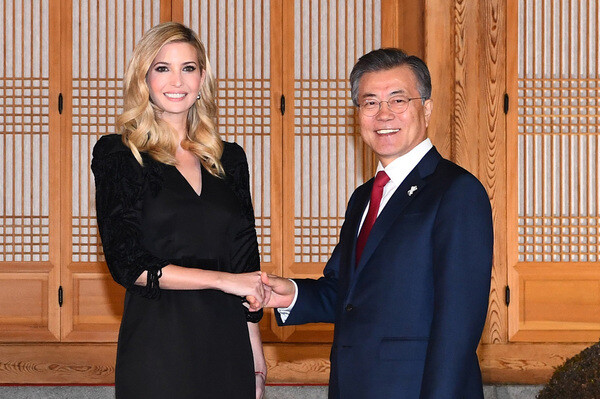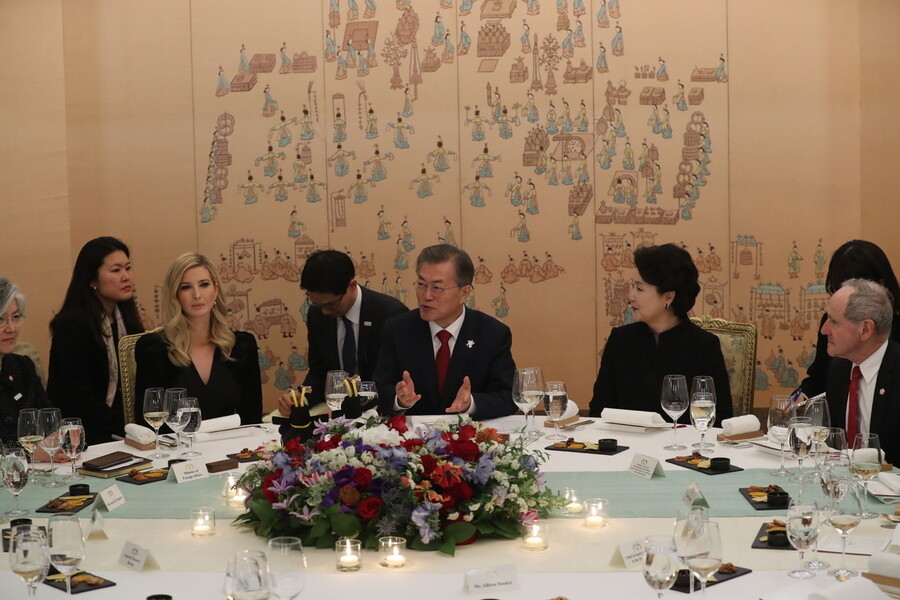hankyoreh
Links to other country sites 다른 나라 사이트 링크
[News Analysis] Pyeongchang Olympics closing ceremony offers opportunity for diplomacy

The closing ceremony of the Pyeongchang Winter Olympics on Feb. 25 is shaping up to be another important stage for diplomacy, following the Olympics opening ceremony on Feb. 9. The American delegation led by Ivanka Trump, eldest daughter of US President Donald Trump and an advisor in the White House, arrived in South Korea on Feb. 23, and a high-ranking North Korean delegation led by North Korean Workers' Party (KWP) Central Committee vice chairman Kim Yong-chol is scheduled to arrive on Feb. 25. Conditions on the Korean Peninsula are expected to be greatly influenced by the way diplomacy plays out during the closing ceremony.
The biggest question during the Pyeongchang Olympics has been whether there will be a meeting between North Korea and the US. There is a period of two days (Feb. 25 and 26) when the North Korea and American delegations will both be in South Korea. The Americans have flatly said they have no plans to meet the contingent led by Kim Yong-chol, and the Blue House has also said it is not planning to arrange a meeting between North Korea and the US.
The chances are low of significant contact between the North Korea and the US delegations. But it is conceivable that Allison Hooker, a member of the American delegation and director of Korean affairs for the White House National Security Council, could meet with low-level officials with the North Korean delegation. Hooker is a veteran in her field who has managed Korean Peninsula affairs since the Obama administration, and she accompanied US Vice President Mike Pence on his recent visit to South Korea.
Even if North Korea and the US do not manage to make contact during the Olympics’ closing ceremony, the door is open for continuing efforts between South Korea, North Korea and the US after the games. During the opening ceremony of the Olympics, it was confirmed that both North Korea and the US are willing to engage in dialogue. The problem is that, since there is still a chill between the two sides, they have been unable to find the starting point to preliminary dialogue.
Speaking to the Conservative Political Action Conference, an annual meeting of conservative groups, on Feb. 22, Pence described KWP Central Committee first vice director Kim Yo-jong as “a central pillar of the most tyrannical and oppressive regime on the planet.” Meanwhile, North Korea’s state-run Rodong Sinmun reconfirmed the regime’s intransigence on Feb. 23: “No sanctions, provocations or threats are capable of tearing down our status as a nuclear power state.”
Also uncertain is how North Korea will respond to the US’s strategy of “simultaneous maximum pressure and engagement,” whereby it toughens sanctions against the North even while holding open the possibility for dialogue with the North. Even as South and North Korea were finally returning to the table for talks during the Pyeongchang Winter Olympics, the US was announcing a plan to put even more pressure on the North.
A senior American official was quoted in a Reuters report on Feb. 22 as saying that the US was “imposing its largest package of sanctions to pressure North Korea” on Feb. 23. Trump announced his new sanctions against North Korea during a speech at the Conservative Political Action Conference, which was held in Maryland on the morning of Feb. 23, EST. The sanctions included measures against 27 business entities and 28 shipping vessels. Peninsular affairs, therefore, are sure to be greatly influenced by how North Korea responds to the US’s new sanctions against it.

Tensions could rise again if joint US-South Korea military exercises resume
One prediction is that, if the mood for dialogue that has been created during the Pyeongchang Winter Olympics does not lead to North Korea-US talks within a month or two of the Pyeongchang Paralympics, which end on Mar. 18, tensions on the Korean Peninsula will rise once more. There is considerable concern that if the delayed South Korea-US military exercises resume after the Paralympics, a strong reprisal by North Korea could make the Olympic Peace nothing more than a “fleeting dream.”
Amid such challenging circumstances, the South Korean government finds itself forced to pursue the difficult task of bridging the divide and narrowing the differences between North Korea and the US to bring them together for talks.
“North Korea and the US have raised the threshold for dialogue so high that it’s not easy for South Korea to act as a mediator that can settle their differences. South Korean diplomacy is important for eliminating this threshold, and those efforts must take place through staggered trilateral dialogue between South Korea, North Korea and the US,” said Kim Yeon-cheol, a professor at Inje University.
“The government needs to have adequate dialogue with Kim Yong-chol while keeping the post-Pyeongchang scenario in mind, and it needs to send an indirect message about improving North Korea-US relations via Ivanka Trump, since she is able to report directly to President Trump,” said Kim Yong-hyun, professor at Dongguk University.
By Park Byong-su, senior staff writer, Noh Ji-won, staff reporter, and Yi Yong-in, Washington correspondent

Editorial・opinion
![[Column] Has Korea, too, crossed the Rubicon on China? [Column] Has Korea, too, crossed the Rubicon on China?](https://flexible.img.hani.co.kr/flexible/normal/500/300/imgdb/original/2024/0419/9317135153409185.jpg) [Column] Has Korea, too, crossed the Rubicon on China?
[Column] Has Korea, too, crossed the Rubicon on China?![[Correspondent’s column] In Japan’s alliance with US, echoes of its past alliances with UK [Correspondent’s column] In Japan’s alliance with US, echoes of its past alliances with UK](https://flexible.img.hani.co.kr/flexible/normal/500/300/imgdb/original/2024/0419/2317135166563519.jpg) [Correspondent’s column] In Japan’s alliance with US, echoes of its past alliances with UK
[Correspondent’s column] In Japan’s alliance with US, echoes of its past alliances with UK- [Editorial] Does Yoon think the Korean public is wrong?
- [Editorial] As it bolsters its alliance with US, Japan must be accountable for past
- [Guest essay] Amending the Constitution is Yoon’s key to leaving office in public’s good graces
- [Editorial] 10 years on, lessons of Sewol tragedy must never be forgotten
- [Column] A death blow to Korea’s prosecutor politics
- [Correspondent’s column] The US and the end of Japanese pacifism
- [Guest essay] How Korea turned its trainee doctors into monsters
- [Guest essay] As someone who helped forge Seoul-Moscow ties, their status today troubles me
Most viewed articles
- 1[Column] The clock is ticking for Korea’s first lady
- 2Hong Se-hwa, voice for tolerance whose memoir of exile touched a chord, dies at 76
- 3After 2 months of delayed, denied medical care, Koreans worry worst may be yet to come
- 4[Column] Has Korea, too, crossed the Rubicon on China?
- 5Samsung barricades office as unionized workers strike for better conditions
- 6US overtakes China as Korea’s top export market, prompting trade sanction jitters
- 7All eyes on Xiaomi after it pulls off EV that Apple couldn’t
- 8[Guest essay] How Korea turned its trainee doctors into monsters
- 9[Editorial] As it bolsters its alliance with US, Japan must be accountable for past
- 10[Correspondent’s column] In Japan’s alliance with US, echoes of its past alliances with UK